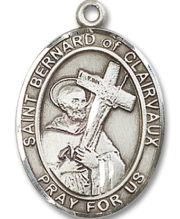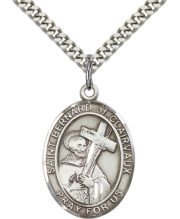Saints
St. Bernard of Clairvaux
St. Bernard of Clairvaux Biography
 St. Bernard of Clairvaux was a 12th century French monk and theologian, who was one of the most influential figures of his time. He was a key figure in the Cistercian Order and was a significant figure in the development of Western monasticism and spirituality.
St. Bernard of Clairvaux was a 12th century French monk and theologian, who was one of the most influential figures of his time. He was a key figure in the Cistercian Order and was a significant figure in the development of Western monasticism and spirituality.
St. Bernard was born into a noble French family in 1090 AD. At the age of 23, he left his home and joined the Cistercian Order, a newly-formed monastic order that emphasized a return to the simplicity of the early Christian monastic life. He became a monk at the Cistercian monastery of Cîteaux and quickly rose to prominence within the order.
In 1115 AD, Bernard was appointed to found a new monastery, Clairvaux, which quickly became one of the most important monastic centers of the Middle Ages. He became the abbot of the monastery and it had a strong influence on the development of Western monasticism and spirituality. Under his guidance, the monastery of Clairvaux grew rapidly, and he would go on to establish over sixty daughter-houses across Europe.
St. Bernard’s theology and preaching were also a central figure of his time. He became one of the most important thinkers of the 12th century, and his sermons were attended by thousands of people. He was a powerful advocate for the Church, and his writings and sermons were widely read and studied. He was also a strong advocate for the Second Crusade, preaching it to many European leaders and going on it himself.
St. Bernard’s theology was marked by his emphasis on the love of God and the importance of personal faith. He stressed the importance of humility, and encouraged his followers to seek a deep personal relationship with God. His sermons and writings emphasized the importance of meditation and contemplation in the spiritual life, and he was one of the first to encourage the use of the Jesus Prayer, a simple prayer of the heart.
St. Bernard’s influence extended beyond the monastic world. He was also sought after by political leaders of his time, including kings and popes, for counsel and guidance on various matters. He was a powerful voice for the Church and his writings, letters, and sermons had a major impact on the intellectual and spiritual life of the Middle Ages.
He died on August 20, 1153 AD, his tomb at Clairvaux quickly became a pilgrimage site, and he was canonized by Pope Alexander III in 1174. Today, his feast day is celebrated on August 20th by the Catholic Church and on August 21st by the Eastern Orthodox Church.
St. Bernard is remembered as one of the most important figures of the Middle Ages and is considered one of the greatest spiritual masters of the Western Church. His teachings and writings continue to be studied and his influence in monasticism and spirituality is widely acknowledged. The Cistercian order that he helped to reform continues to thrive and his rule is still followed by many monasteries and monks today.
The Life of St. Bernard of Clairvaux
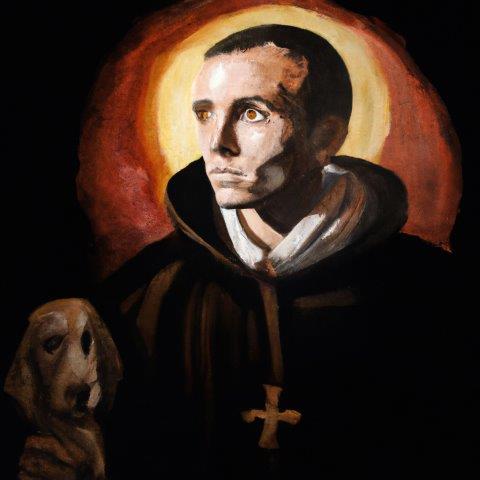 Saint Bernard was born at Fontaines, in the year 1090, the third son of Tescelin and his wife Aleth, both of whom were worthy to be the parents of a Saint. All of their children were offered to God at their birth, and God accepted the offering, for their six sons became Monks at Citeaux and their one daughter a Nun. But Bernard was especially devoted to God’s service.
Saint Bernard was born at Fontaines, in the year 1090, the third son of Tescelin and his wife Aleth, both of whom were worthy to be the parents of a Saint. All of their children were offered to God at their birth, and God accepted the offering, for their six sons became Monks at Citeaux and their one daughter a Nun. But Bernard was especially devoted to God’s service.
Harassed with doubts and perplexities, one day he entered a church and prayed for guidance. He heard voice saying to him in the words of the Apocalypse (22:17) “And he that heareth, let him say: Come”; and when he left the church he had determined to accept the invitation of God. But he did not go alone: first his uncle, then his brothers, and finally several of his friends resolved to follow where he led, until he had gathered around him thirty disciples. For six months they led a community life at Chatillon, and when all difficulties had been removed they set out for Citeaux. Bernard’s arrival was the turning point in the history of Citeaux, as the entry of so many postulants ensured the future of the Order.
In 1115, Bernard, although young in years and young in the monastic life, was chosen to found a new monastery. The site selected presented almost hopeless difficulties. It was in the diocese of Langres, on the left bank of the Aube, called the Valley of Bitterness. Later the name was changed, perhaps by Bernard himself, to Clara Vallis (Clairvaux, or the Bright Valley). Bernard with twelve companions (four of whom were his brothers ) set out to face the hardships that awaited them-cold, hunger, and the want of everything.
The Great Preacher
Bernard encouraged his companions by precept and example. When their needs became known, relief was given. Later this monastery became known as the celebrated Abbey of Clairvaux, of which St. Bernard remained Abbot for the rest of his life. Clairvaux, in turn, led to the creation of one hundred and sixty other Cistercian houses. St. Bernard became the most conspicuous person in the 12th century.
The effect of his fervent, eloquent preaching in the diocese of William of Champeaux was astonishing and instantaneous. Men of all classes followed him to Clairvaux. He became, and remained until his death, the arbiter of kings, the counsellor of Popes, the champion of the Church. The influence he wielded on the spirituality of the West was enormous. He was commissioned by Pope Eugene III, to preach the Second Crusade in 1146. His preaching kindled the enthusiasm of Christendom and in influenced the European politics of his age.
St. Bernard died at Clairvaux on August 20, 1153, and was buried in the Ladye-Chapel of his Abbey. Since its destruction in 1792, his relics have been venerated in the neighboring parish church. St. Bernard was canonized by Pope Alexander III, in 1804, the first of the Cistercians to be so honored; and he was proclaimed a Doctor of the Church by Pope Pius VIII, in 1830.
Prayer to St. Bernard
Prayer for Humility
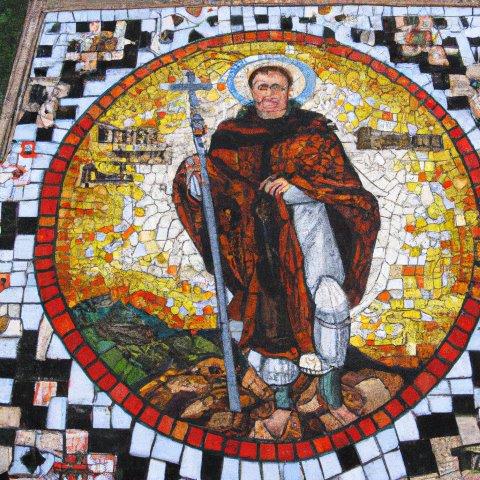 O St. Bernard of Clairvaux, intercede for me that I may be humble in heart, obedient in all things to God’s will, and self-effacing in service to others. May I seek not my own interests, but the interests of Jesus Christ and of His holy Church.
O St. Bernard of Clairvaux, intercede for me that I may be humble in heart, obedient in all things to God’s will, and self-effacing in service to others. May I seek not my own interests, but the interests of Jesus Christ and of His holy Church.
Prayer for Wisdom
O St. Bernard of Clairvaux, prayerful and learned Doctor of the Church, I ask for your intercession that I may grow in wisdom and understanding. May I learn to discern God’s will in all things and live my life according to His holy plan.
Prayer for Devotion to Mary
O St. Bernard of Clairvaux, devoted lover of the Blessed Virgin Mary, I ask for your intercession that I may imitate your deep love and devotion to her. May I always seek her maternal protection, comfort, and guidance in all things, especially in moments of trial and temptation.
Prayer for Strength in Persecution
O St. Bernard of Clairvaux, who suffered persecution and ridicule for your faith, I ask for your intercession that I may have the strength to endure any persecution or opposition that I may face in my own life. May I remain steadfast in my faith, always trusting in God’s love and providence.
St. Bernard of Clairvaux: The Patron Saint of Beekeepers and the Cistercian Order
St. Bernard of Clairvaux was a 12th-century French abbot and preacher who is revered as one of the most important saints in the Western Church. He is the patron saint of beekeepers and the Cistercian order, and is also considered a spiritual teacher and doctor of the Church. In this blog post, we’ll explore the reasons why St. Bernard is so revered and what he represents in the eyes of the faithful.
St. Bernard’s life and legacy
Bernard was born in 1090 in the Burgundy region of France and was the third of seven children. He was educated at the famous Cluny Abbey, and after completing his studies, he felt a strong calling to join the monastic life. He founded the Cistercian order along with a group of friends, and the order quickly became renowned for its simplicity and devotion.
Bernard was known for his eloquent preaching and teaching, and he quickly became one of the most influential figures in the Church. He was a key figure in the Second Crusade, and was highly respected for his wisdom and spirituality. He wrote many works, including a number of hymns and sermons that are still used in the Church today.
Why is St. Bernard the patron saint of beekeepers?
St. Bernard is the patron saint of beekeepers for a unique reason. According to legend, he was once preaching in the countryside and came upon a group of beehives that had been disturbed by a group of children. Bernard blessed the beehives, and the bees immediately returned to their hives and became calm. From that point on, beekeepers began to pray to St. Bernard for protection and guidance, and he became known as the patron saint of beekeepers.
Why is St. Bernard the patron saint of the Cistercian order?
St. Bernard is the patron saint of the Cistercian order because he founded the order along with a group of friends. The Cistercian order is known for its simplicity and devotion, and its monasteries were some of the largest and most influential in Europe. Bernard himself was a spiritual teacher and doctor of the Church, and his teachings continue to inspire people to this day.
St. Bernard of Clairvaux was a powerful figure in the 12th-century Church, and his legacy continues to have an impact on the world today. As the patron saint of beekeepers and the Cistercian order, he is revered for his contributions to monastic life and spirituality, and for his wisdom and eloquence. Whether you are a beekeeper or a member of the Cistercian order, St. Bernard is a inspiring example of what it means to live a life of devotion and service to God.” “
Reflection on the feast day of St. Bernard of Clairvaux
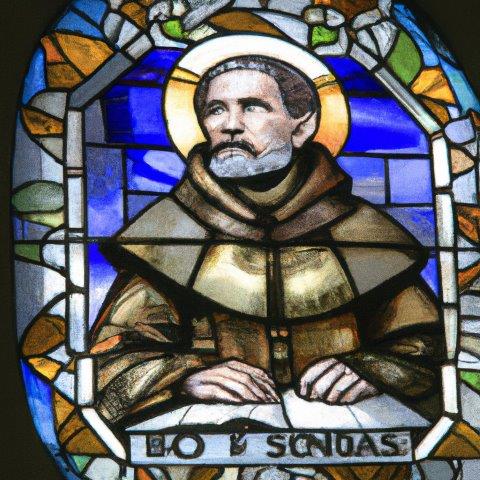 The feast day of St. Bernard of Clairvaux is August 20th.
The feast day of St. Bernard of Clairvaux is August 20th.
In today’s feast of St. Bernard of Clairvaux, we are reminded of the importance of humility and simplicity in our spiritual lives. St. Bernard, a Cistercian monk, was known for his profound humility and deep devotion to God. He was a great spiritual leader of his time, and his writings continue to inspire and guide us today.
As we reflect on St. Bernard’s life, we are reminded of the power of humility in our own lives. In a world that often values success, power and wealth, it can be easy to get caught up in the pursuit of these things. However, St. Bernard reminds us that true fulfillment and happiness can only be found in humility and a deep connection to God.
In his famous homilies, St. Bernard urges us to seek God in all things and to put aside our own desires and ambitions in order to serve God more fully. He reminds us that in our humility, we can find true freedom and joy.
In this feast of St. Bernard of Clairvaux, let us reflect on the importance of humility in our own lives. Let us ask for the grace to put aside our own desires and ambitions, and to seek God in all things. May we be inspired by the example of St. Bernard, and may we strive to be more like him in our own lives. May we be filled with the peace and joy that can only come from humility and a deep connection to God.
Discover biographies, prayers, and reflections for more than 400 Catholic Saints

Saints Similar to St. Bernard of Clairvaux
You may also be interested in reading the Biography of St. Benedict and the Biography of St. Hildegard von Bingen. St. Bernard of Clairvaux, St. Benedict, and St. Hildegard von Bingen were influential figures in monastic and theological traditions. St. Bernard was a Cistercian monk and theologian. St. Benedict is considered the father of Western monasticism. St. Hildegard was a mystic and polymath known for her writings and music. Next up: Biography of St. Bernard of Montjoux
Also check out our handmade St. Bernard of Clairvaux Medal and St. Bernard of Clairvaux Rosary and St. Bernard of Clairvaux Rosary Bracelet.

